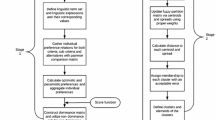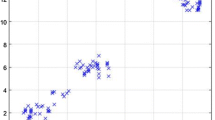Abstract
In order to increase the sales share, mobile phone manufacturers must understand the needs of consumers. The traditional c-means analysis method is sensitive to distance, and the shortcomings of the traditional method can be overcome with the help of fuzzy control theory. In this paper, 200 college students are randomly selected to conduct a questionnaire survey on the six factors affecting the purchase of smart phones, and the data are analyzed by using the improved fuzzy c-means clustering. The results show that the function, appearance and brand of mobile phones have an impact on the purchase of mobile phones. The results are helpful for mobile phone manufacturers to understand users’ consumption psychology and improve product competitiveness.
Access this chapter
Tax calculation will be finalised at checkout
Purchases are for personal use only
Similar content being viewed by others
References
Wu, W., Yin, B.: Personalized recommendation algorithm based on consumer psychology of local group purchase e-commerce users. J. Intelli. Fuzzy Sys. 37(5), 5973–5981 (2019)
Kühbauch, G.W.: A new algorithm for automatic Rumex obtusifolius detection in digital images using colour and texture features and the influence of image resolution. Precision Agriculture (2007)
Canellidis, V., Giannatsis, J., Dedoussis, V.: Genetic-algorithm-based multi-objective optimization of the build orientation in stereolithography. Int. J. Adv. Manuf. Technol. 50(1–4), 419 (2010)
Luo, L., et al.: Curve fitting using a genetic algorithm for the X-ray fluorescence measurement of lead in bone. J. Radioanal. Nucl. Chem. 269(2), 325–329 (2006)
Fischer, B., Modersitzki, J.: A Super Fast Registration Algorithm. Springer, Berlin Heidelberg (2001)
Millán, S., et al.: An Algorithm to Calculate the Expected Value of an Ongoing User Session. Springer Berlin Heidelberg (2005)
Kong, Y.T., et al.: Cricothyrotomy training increases adherence to the ASA difficult airway algorithm in a simulated crisis: a randomized controlled trial. Canadian Journal of Anesthesia/Journal canadien d'anesthésie (2015)
Pandian, P.P., et al.: Secondary population implementation in multi-objective evolutionary algorithm for scheduling of FMS. Int. J. Adv. Manuf. Technol. 57(9–12), 1143 (2011)
Cinaroglu, S.: Comparison of Fuzzy C-Means and K-Means Clustering Performance: An Application on Household Budget Survey Data (2021)
Singh, S., Srivastava, S.: Kernel fuzzy C- means clustering with teaching learning based optimization algorithm (TLBO-KFCM). J. Intelli. Fuzzy Sys. 1, 1–9 (2021)
Kuo, R.J., Lin, J.Y., Nguyen, T.: An application of sine cosine algorithm-based fuzzy possibilistic c-ordered means algorithm to cluster analysis. Soft. Comput. 25(11), 1–16 (2021)
López-Oriona, N., et al.: Quantile-based fuzzy C-means clustering of multivariate time series: Robust techniques (2021)
Tokat, S., et al.: Fuzzy C-means clustering-based key performance indicator design for warehouse loading operations. J. King Saud Univ. Comp. Info. Sci. (2021)
Saxena, S., Kumari, N., Pattnaik, S.: Brain Tumour Segmentation in FLAIR MRI using sliding window texture feature extraction followed by fuzzy C-Means clustering. Int. J. Healthc. Info. Sys. Info. (IJHISI), 16 (2021)
Author information
Authors and Affiliations
Corresponding author
Editor information
Editors and Affiliations
Rights and permissions
Copyright information
© 2023 ICST Institute for Computer Sciences, Social Informatics and Telecommunications Engineering
About this paper
Cite this paper
Shufen, S. (2023). Application of Fuzzy c-Means Clustering Algorithm in Consumer Psychology. In: Jan, M.A., Khan, F. (eds) Application of Big Data, Blockchain, and Internet of Things for Education Informatization. BigIoT-EDU 2022. Lecture Notes of the Institute for Computer Sciences, Social Informatics and Telecommunications Engineering, vol 465. Springer, Cham. https://doi.org/10.1007/978-3-031-23950-2_29
Download citation
DOI: https://doi.org/10.1007/978-3-031-23950-2_29
Published:
Publisher Name: Springer, Cham
Print ISBN: 978-3-031-23949-6
Online ISBN: 978-3-031-23950-2
eBook Packages: Computer ScienceComputer Science (R0)




